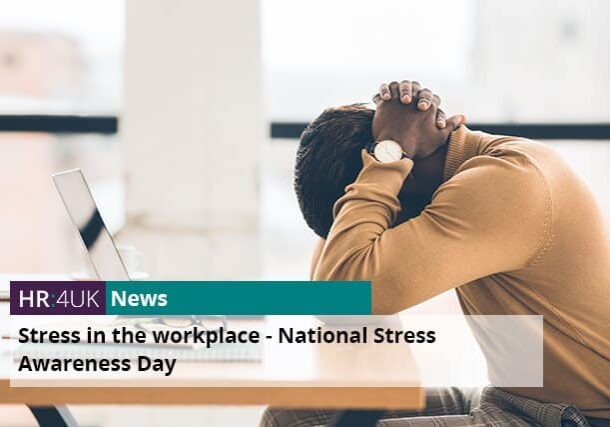Stress in the Workplace – National Stress Awareness Day

National Stress Awareness Day is an annual event which provides a great opportunity to not only raise awareness of the impacts of stress, but also ways to mitigate the negative side effects. At HR:4UK, we value our employees’ mental health and wellbeing which is why we are constantly harnessing the power of a positive workforce culture.
According to the Health and Safety Executive, work-related stress is defined as, ‘a harmful reaction people have to undue pressures and demands placed on them at work.’ Research has highlighted the negative impacts stress can inflict on not only the individual experiencing stress, but also the business they work for. The Labour Force Survey revealed that during 2019/2020, a significant 828,000 workers suffered from work-related stress health problems, and subsequently 17.9 million working days were lost, thus emphasizing the extent of the issue.
National Stress Awareness Day is therefore so critical:
- Life is precious – spending your life stressed can negatively impact your quality of life
- Stress can affect your health – with the symptoms ranging in severity and manifestation
- It’s important to be able differentiate between ‘good stress’ and ‘bad stress’
The difference between ‘good stress’ and ‘bad stress’
Stress has arguably become synonymous with negative connotations, and whilst this can be the case, certain levels of stress can facilitate optimum working conditions, resulting in desirable performance (‘good stress’).
However, when stress becomes ongoing and chronic, the effects can be detrimental (‘bad stress’). For example, stress can manifest in a variety of ways, ranging from physical symptoms including fatigue and headaches; physiological symptoms such as depression and anxiety; and behavioural symptoms including aggression and irritability.
Understanding the causative factors which can lead to work-place stress
Within the working environment are various ‘stressors’ which can cause heightened stress levels and these include any demand, situation, internal stimulus or circumstance which pose a real or perceived threat to a person’s balance. There are individual differences in threshold levels for which the stress levels become unbearable. For example, whilst one person may be able to cope with a certain situation with ease, this may trigger a stress response from another person.
One stressor for example, may be email. For some, that could be a confusing statement, however countless individuals experience high levels of stress due to this type of communication. It may be the demanding client who requires around the clock attention, that inner feeling to go the extra mile, even out of work hours, or the boss who sends emails at 12am. Having access to your emails on your phone means work is only ever a click of a button away, and it can therefore be very easy to constantly check for any updates, igniting a sense of guilt if you don’t reply immediately. That being said, for some, having remote access to their emails can relieve stress, as it allows them to manage their workload.
Helpful tips for dealing with stress
Learning to manage your employees’ stress is an essential skill which takes time to harness. Although there are individual differences in stress management, here are some handy tips to keep in mind and try:
- Communicate well with your team – Employees who have previously experienced mental ill health may find it beneficial to discuss their condition and coping strategies eg:
- Triggers, symptoms and early warning signs.
- How mental ill health may impact their performance.
- What support they need from their manager.
- Break down tasks – A large task may appear daunting, however, once it’s broken down into smaller more manageable chunks, your employees might feel more at ease. Lists can be a great way of managing stress by acknowledging when a task has been completed.
- Positivity- Not everyone is born an optimist, but this approach really can help. Try and bring a level of positivity and encouragement to your team. Why not practice gratitude once a week?
- Additional training – Consider training yourself and your management team to able to recognise signs of stress/ mental ill health, and how to support your team during these periods. Many companies benefit from appointing a dedicated mental health first aider as the first point of contact.
What we do at HR: 4UK to support our employees
At HR:4UK, we recognise how important it is to support our employees’ mental health. During the pandemic we became extremely busy due to our services being in high demand. Our MD, Angela Clay, recognised this and therefore sent each working employee a KitKat in the post, encouraging them to ‘take a break’. In addition, HR:4UK adopted a remote working operation to adhere to the government guidelines. Catch-up calls via zoom were therefore utilised, ensuring effective communication was maintained throughout.
Every day, we commence the day with a morning meeting to address any issues we are facing. This provides a great opportunity for employees to be fully transparent with any issues – either work-related or personal. This then allows other employees to step in when possible, or offer support in any other way. Whilst the morning meeting is great for business purposes, it is also an opportunity to strengthen employee relationships.
Another scheme we have in place is an employee assistance programme (EAP) which employees are able to access for medical needs – ranging from dental check-ups, to GP services and therapy. HR:4Uk therefore recognizes the importance of health care, encouraging employees to utilize this scheme when they require.
Angela Clay
A qualified employment law solicitor and our managing director, Angela has unparalleled legal expertise and decades of experience and knowledge to draw from. She’s a passionate speaker and writer that loves to keep employers updated with upcoming changes to legislation, and is a regular guest speaker on BBC Leicester Radio.




